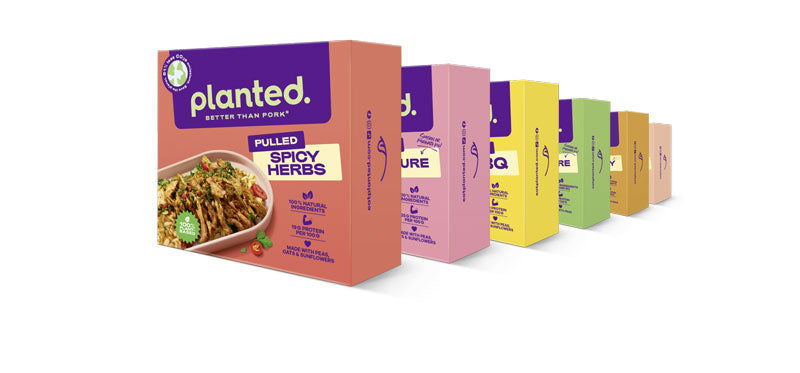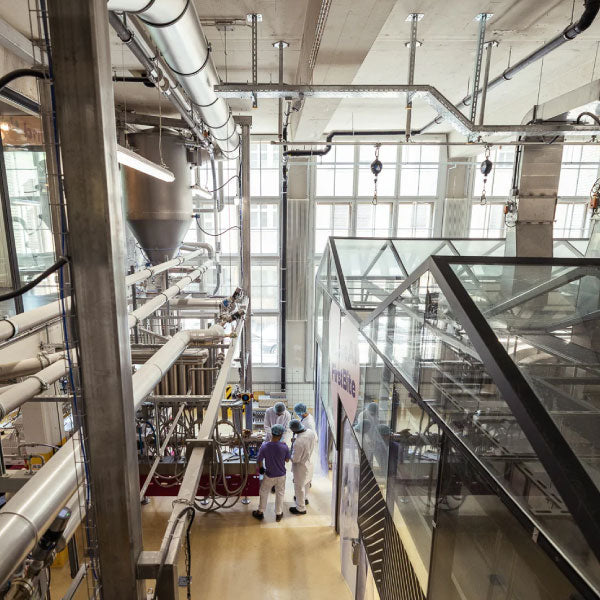
Better than meat from animals: Planted meats save up to 87% of greenhouse gas emissions and up to 90% water
Kemptthal, Switzerland, 1st March 2023– Swiss Foodtech Startup Planted, known for its clean-label plant-based meat, publishes updated product lifecycle assessment calculations audited by third party company Eaternity that prove Planted meats have significantly better product footprint in terms of greenhouse gas emissions and water usage than their animal counterparts.
The food system has a massive impact on us and on the planet. Humanity’s current way of exploiting natural resources and farming livestock for meat consumption on a large scale is unsustainable, destroys our environment and speeds up climate change. Thereby threatening food security of 8 billion people. Swiss Foodtech Startup Planted recognizes its role in the food system and believes it’s time to make a meaningful shift towards healthy plant-based eating habits. To undermine this push, Planted took an important step towards measuring Its impact by conducting a life cycle assessment (LCA) of its four core products. The first assessment was conducted in 2019/2020. To monitor and record the products' environmental impact an update of the CO2 and water footprint was conducted at the end of 2022 to now be published. These calculations were done with the help of Eaternity, an independent environmental footprint expert specializing in life cycle assessment of food products. The analysis reconfirmed that Planted’s plant-based meat portfolio displays huge saving potential when compared to animal meat, with 77-87% less CO2-equivalent emissions generated and 75-90% of water saved.
Additionally, all Planted meats were re-certified with the Eaternity Score. Same as in 2021, they scored the highest across all impact categories: CO2, water scarcity, rainforest and animal welfare - meaning Planted meats are a great fit for a climate-friendly and water-efficient diet.
Food production has a major impact on the world’s GHG emissions
The negative environmental impacts of animal products exceed by far those of plant-based options, even though they only provide 37% of our protein and 18% of our calories. Around one quarter (26%) of global emissions come from food and more than half (58%) of food emissions come from animal products. Clearly, livestock farming produces higher carbon emissions than growing vegetables, fruits and grains. Moreover, farming takes up half of the planet’s habitable surface and animal agriculture contributes to a loss of biodiversity, as forests and wild lands are turned into fields to grow animal feed, especially in tropical climates. This results in the loss of natural carbon sink that acts to cool global temperature. On top of it all, humanity ‘s water resources are polluted by animal agriculture discharge, and further strained to irrigate feed crops.
Better than meat from animals - Great taste, tiny footprint
The greenhouse gas emissions (CO2-eq) and water footprint (fresh & scarce) are analysed across the whole life cycle of a product and are compared to their most similar animal counterparts (e.g. planted chicken was compared to animal chicken breast).
|
|
CO2 |
Water |
|
Planted.chicken |
77% |
85% |
|
Planted.pulled |
83% |
75% |
|
Planted.kebab |
87% |
85% |
|
Planted.schnitzel |
87% |
90% |
Greenhouse gas emissions
The comparison to animal meat products was calculated based on cradle -to-gate basis to determine how much CO2-equivalent emissions are emitted during its lifecycle until the product leaves the production gate (incl. agricultural production of raw materials and processing), but excluding e.g. transport to the stores, as this step is similar for both meat types.
The assessment established that all Planted meats available in retail emit 77-87% less CO2 -eq. when compared to their animal counterparts. The most significant reductions come from avoiding animal farming emissions.
Example of planted.chicken: planted.chicken is responsible for 1.62 kg CO₂eq/kg, whereas chicken breast for 7.01 kg CO₂-eq/ kg. This means that planted.chicken produces 77% less CO₂-eq emissions compared per weight of product.
Fresh and scarce water resources
This comparison was calculated to determine how much water is used for crop irrigation as well as the water used for drinking, animal housing, during slaughtering as well as production.
The assessment established that all Planted meats available in retail use 75-90% less fresh water when compared to their animal counterparts. Larg amounts of water are needed to irrigate feed crops and additional resources are used during the animal's lifetime. All Planted’s plant-based meats have a very low water scarcity footprint, meaning the sourced ingredients originate from regions with no or little water scarcity.
Example of planted.chicken: 1kg of chicken breast consumes 755 L of fresh water and 204 L of scarce water respectively. Comparing planted.chicken with chicken breast, Planted uses 85% less fresh water and 80% less scarce water per weight of product.
Savings with Planted products
To Planted consumers, this signifies that the choice of a planted.schnitzel over a pork schnitzel can reduce the climate footprint by 87% of CO2 -eq. per kilogram. During the production of one kilogram of pork schnitzel, the equivalent of driving 54km (equivalent to driving from Planted`s Headquarter in Kemptthal to Lucerne) in a conventional car is emitted, compared to planted.schnitzel, which generates the GHG emissions equivalent of driving 7km (equivalent to driving from Planted`s Headquarter in Kemptthal to Winterthur).
To produce one kilogram of pork schnitzel the amount of water equivalent to running a standard dishwasher 67 times is needed. Planted.schnitzel needs the equivalent of 7 dishwasher runs, saving 90% of water.
For Planted’s Co-Founder Christoph Jenny, these values further emphasize that the company is on the right track “We set our company ambition to offer products that are better than animal meat, without the negative environmental consequences associated with animal agriculture. We wanted to create natural products to give future generations more choice, that do our planet good, are healthy and taste amazing. The updated assessment showed even higher effects due to our improved recipes, better packaging and changed distribution schemes on the carbon and water footprint. We are proud of every step we make forward but won’t stand still either. Reducing plastics and energy in our supply chain is a key focus point”.
Vision
Planted is stepping up their impact even further by launching their first as well as future bigger and redder pieces of meat. This will allow consumers to make plant-based positive choices in all daily meat consumption situations, without compromising on taste or texture. When it comes to converting feed and other natural resources to provide humangrade food, beef and other ruminant meats are the most inefficient sources of calories and protein.














